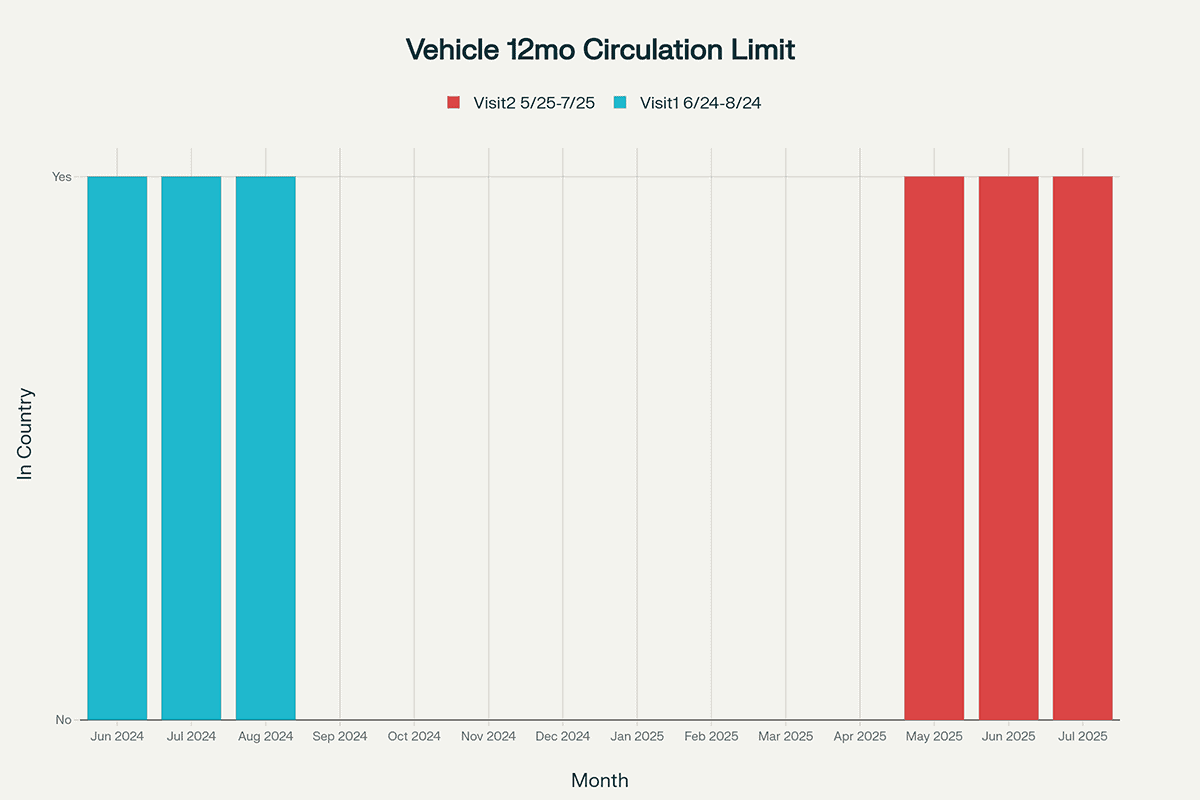Greeks have a special relationship with their cars. It is not just about getting from place to place. As the saying goes, “καβάλα πάν’ στην εκκλησιά, καβάλα προσκυνάνε”, they ride to the church and pray while still on horseback. It is a playful nod to comfort and pride, and in the age of the automobile, it still fits. Even the word αμάξι comes from άμαξα, the horse-drawn carriage that once served the same role.
So it is no surprise that the Greek state has always kept a close eye, and a steady tax hand, on car ownership. That includes the rules for bringing your own vehicle into the country. If you live outside Greece, whether that is Philly or Stuttgart, you might have thought about bringing your own car to Greece for the summer or an extended visit. Maybe you want to skip the rental counter at the airport, or you just like the idea of driving the car you know through the roads you remember. Greece lets you do that, but only if you meet some very specific rules for what is called temporary importation. They are not impossible to follow, but they are strict, and if you get them wrong the fines can be steep.
The main rule comes down to where you actually live most of the year.
To qualify, you must live outside Greece for at least 185 days over a twelve-month period. Your time in Greece must be temporary, and the car is for personal use only. If that is the case, you can keep it in Greece for up to six months in any twelve-month window.
Those six months can be one long stretch or split into smaller visits, but the total time cannot go over the limit.
The most common way people qualify is by being a permanent resident abroad, whether your plates are from Pennsylvania, Baden-Württemberg, or somewhere else. Greeks who still have their home in Greece but work abroad for half the year or more also qualify, as do their spouses if they continue to live outside Greece. Foreign nationals married to Greek permanent residents can also bring a car as long as they still live abroad.
Students have their own allowances. Greek students at foreign universities can have their car in Greece for three months a year. Foreign students studying in Greece can keep a car for as long as they are enrolled. Visiting academics can keep one for up to four years, and foreign teachers on fixed-term contracts can keep theirs for the length of their appointment.
Certain professionals also qualify. Foreign workers with fixed-term contracts in Greece, Greek diplomats and consular staff on temporary return, and Greek seafarers who work on overseas ships for at least half the year can bring a car for a set period.
Some special cases are covered, too. Greeks moving back to the country or political refugees can bring a car for six months while sorting out customs. People transferring their residence get a one-month window to complete the process.
Greeks working in other EU countries who have a company car registered there may be able to use it in Greece without a time limit, but this is only under strict conditions. The vehicle must be registered in the EU country where they work, be part of their employment benefits, and be primarily used outside Greece. Their employment contract must clearly specify that the car is provided for work or as part of their remuneration. Customs authorities will look at both the contract and the car’s actual usage, and they may impose conditions if it appears the vehicle is being used mainly in Greece.
Diplomatic and consular personnel, as well as certain staff of international organizations operating under agreements with Greece, may have separate exemptions that allow them to keep a vehicle in the country for the full duration of their service without the standard six-month limit.
Not everyone qualifies.
If you spend more than half the year in Greece, you are considered a tax resident and you are out of the running. Commercial vehicles are not covered, and neither is any car you plan to use for work or income. Even if you do qualify, there are rules on how the car can be used. You cannot lend it to friends or extended family; only your spouse, children, or parents can drive it. You cannot rent it, sell it, or use it as collateral, and you cannot use it for business.
Here is a quick check to see if you are in the clear before you even think about shipping or driving your car over:
Do You Qualify to Bring Your Car to Greece?
- You live outside Greece for at least 185 days a year
- Your time in Greece is temporary, no more than six months in any twelve-month period
- The car is for personal use only and will stay in your name
- Only you, your spouse, your kids, or your parents will drive it
- It is an allowed vehicle type: passenger car, motorcycle, motor caravan, small boat, small aircraft, or saddle horse
- You have the documents: registration, proof of purchase with taxes paid, and insurance valid in Greece
You do not qualify if:
- You are a Greek tax resident (185+ days/year in Greece)
- The vehicle is commercial or a truck
- You want to use it for business
- You plan to lend it to friends or extended family
If you are unsure, check with Greek Customs or a Greek consulate before you travel.
How the Six-Month Clock Works
The six-month limit is not tied to the calendar year; it is any rolling twelve-month period. That means if you bring your car in on June 1 and stay until the end of August, you have used up three months. If you come back the following May and stay until July, that is another three months. You have now hit your six-month limit for the twelve-month window that started the previous June. You have to wait until the first visit is outside that twelve-month frame before you can bring the car in again without breaking the rules.

Example of the six-month limit in a rolling twelve-month period. Two separate visits, June to August 2024 and May to July 2025, still count toward the same twelve-month window, reaching the maximum allowed time.
In the past, some Greek residents with foreign plates tried to “refresh” their paperwork by taking a quick ferry trip to Italy just to get a dated ticket. The idea was to have proof of a recent border crossing if stopped at a checkpoint. This practice is now generally considered irrelevant.
In exceptional situations, such as illness, mechanical breakdown, or travel disruption, customs authorities may grant an extension of up to 15 days beyond the six-month limit. This has to be requested before the limit expires and supported with proper documentation.
After the Six Months Are Up
Once a vehicle has been in Greece for the maximum six-month period within a twelve-month window, the law requires one of two things:
- The vehicle must be re-exported out of Greece, or
- It must be immobilized, stored in private or public parking, and officially declared to Greek customs.
The immobilization period cannot exceed twenty-four months. During or after that period, if the owner can prove they have remained a permanent resident abroad (with at least 185 days spent outside Greece in the last twelve months before requesting reactivation), they can bring the vehicle back into use for another six months within a new twelve-month window.
This cycle can be repeated as long as residency and all other requirements are met.
If no reactivation, export, or customs clearance takes place within those twenty-four months, the vehicle is considered “unclaimed” by customs and may be subject to forfeiture or other legal actions.
The six-month rule is not the only thing that can get you in trouble. Who drives the car matters just as much. A friend of mine in Thessaloniki found that out when her husband, who works in Germany, left his company car there for her to use. One morning, she drove their child to school and was stopped by customs. As a Greek tax resident, she was not allowed to drive that foreign-registered company car. The fine was steep, and now she is trying to prove she is also employed by her husband in hopes of keeping it legal. The outcome is still uncertain.
The list of rules may sound strict, but they are being applied more firmly than ever. Greece has faced pressure from the EU to enforce them more consistently, especially for EU-registered vehicles, so expect more checks and less leniency at ports and borders.
The types of vehicles covered are fairly broad, but trucks and most commercial vehicles are excluded. If you do decide to bring your car, you will need to arrive with all the right paperwork. Customs will want to see valid registration plates from your home country, the registration document itself, proof that you bought the car legally and paid taxes where you live, and insurance that is valid in Greece — often a Green Card from your insurer. If your plates have expired, you will need temporary Greek plates before you can drive.
Breaking the rules can get expensive. If you go over your allowed time, there is a daily fine that goes up with engine size. Let someone drive the car who is not allowed, and you could be looking at a fine from €700 to €5,000. If customs decides you have broken the conditions altogether, you might have to pay full import duties and VAT.
Bringing your own car to Greece can make an extended stay more comfortable and practical, but it only works out well if you are sure you qualify and you stick to the conditions. In a country where the car has long been more than just transport, from the days of the άμαξα to the modern αμάξι, it is worth making sure the pride of having your own wheels in Greece does not turn into an expensive mistake.
Cosmos Philly is made possible through the support of sponsors and local partners. If you’d like to become a sponsor or promote your business to our community, get in touch.








